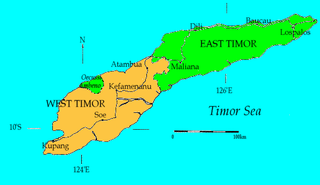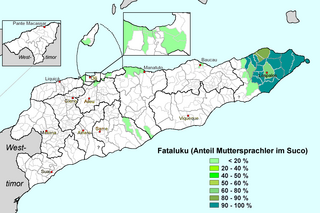Related Research Articles

West Timor is an area covering the western part of the island of Timor, except for the district of Oecussi-Ambeno. Administratively, West Timor is part of East Nusa Tenggara Province, Indonesia. The capital as well as its main port is Kupang. During the colonial period, the area was named Dutch Timor and was a centre of Dutch loyalists during the Indonesian National Revolution (1945–1949). From 1949 to 1975 it was named Indonesian Timor.
The VPRO is a Dutch public broadcaster and part of the Dutch public broadcasting system. It was founded in 1926 as a liberal Protestant radio station. In the 1950s and 1960s, it gradually became social liberal rather than Protestant, and the original meaning of the acronym was eventually dropped.

Limburgish refers to a group of South Low Franconian varieties spoken in Belgium and the Netherlands, characterized by their distance to, and limited participation in the formation of, Standard Dutch. In the Dutch province of Limburg, all dialects, despite their differences, have been given collectively a regional language status, including those comprising "Limburgish" as used in this article.

The languages of Timor-Leste include both Austronesian and Papuan languages. The lingua franca and national language of Timor-Leste is Tetum, an Austronesian language influenced by Portuguese, with which it has equal status as an official language. The language of the Oecusse exclave is Uab Meto (Dawan). Fataluku is a Papuan language widely used in the eastern part of the country. A dialect of Malay-based creole called Dili Malay is spoken by a number of residents in the capital Dili, it borrowed words mostly from Portuguese and Tetum. Both Portuguese and Tetum have official recognition under the Constitution of Timor-Leste, as do other indigenous languages, including: Bekais, Bunak, Galoli, Habun, Idalaka, Kawaimina, Kemak, Lovaia, Makalero, Makasae, Mambai, Tokodede and Wetarese.

East Flemish is a collective term for the two easternmost subdivisions of the so-called Flemish dialects, native to the southwest of the Dutch language area, which also include West Flemish. Their position between West Flemish and Brabantian has caused East Flemish dialects to be grouped with the latter as well. They are spoken mainly in the province of East Flanders and a narrow strip in the southeast of West Flanders in Belgium and eastern Zeelandic Flanders in the Netherlands. Even though the dialects of the Dender area are often discussed together with the East Flemish dialects because of their location, the latter are actually South Brabantian.

Fataluku is a Papuan language spoken by approximately 37,000 people of Fataluku ethnicity in the eastern areas of East Timor, especially around Lospalos. It is a member of the Timor-Alor-Pantar language family, which includes languages spoken both in East Timor and nearby regions of Indonesia. Fataluku's closest relative is Oirata, spoken on Kisar island, in the Moluccas of Indonesia. Fataluku is given the status of a national language under the constitution. Speakers of Fataluku normally have a command of Tetum and/or Indonesian, those speakers who are educated under Portuguese rule or from younger generation educated under Portuguese-language educational system during independence speak Portuguese.
August Willemsen was a Dutch translator of Portuguese and Brazilian literature. He also published essays, diaries and letters. Willemsen was known for his powerful use of the Dutch language and his flawless style.

Willem Theodoor "Wim T." Schippers is a Dutch artist, comedian, television director, and voice actor. During the 1960s, he worked mostly as a visual artist, associated with the international Fluxus-movement. As a television writer, director, and actor he is responsible for some of the most notable and controversial shows on Dutch televisions from the 1960s to the 1990s, creating a number of lasting characters and enriching the language with terms and expressions first coined in his shows. In addition, he voiced the characters of Ernie and Kermit the Frog on Sesamstraat, the Dutch version of Sesame Street. For his shows, he has written over three hundred songs, and his reputation has changed from being Dutch television's "enfant terrible" to an acknowledged master in a variety of genres.

Slavink is a Dutch meat dish consisting usually of ground meat called "half and half" wrapped in bacon, and cooked in butter or vegetable oil for about 15 minutes. A variation of the dish called blinde vink is made by wrapping ground veal in a thin veal cutlet. Slavinken and blinde vinken are usually prepared and bought at the butchery or the supermarket; a standard slavink, before cooking, weighs around 100 grams. The bacon is "glued" to the filling with transglutaminase, an enzyme that bonds proteins.

The predominant language of the Netherlands is Dutch, spoken and written by almost all people in the Netherlands. Dutch is also spoken and official in Aruba, Bonaire, Belgium, Curaçao, Saba, Sint Eustatius, Sint Maarten and Suriname. It is a West Germanic, Low Franconian language that originated in the Early Middle Ages and was standardised in the 16th century.
The Timoric languages are a group of Austronesian languages spoken on the islands of Timor, neighboring Wetar, and Southwest Maluku to the east.

Willy Mullens was a Dutch producer, director, and promoter of movies. He is considered to be one of the early pioneers of Dutch cinema, and one of his movies was recently elected as one of only sixteen "Canonical Dutch movies." With his brother Bernardus Albertus (Albert) he started around the turn of the 20th century one of the earliest Dutch film production companies, Alberts Frères. By the second decade of that century he was making documentary films that premiered for royalty. His second company, Haghefilm, dominated the Dutch film market between the two World Wars.

Makuva, also known as Makuʼa or Lóvaia, is an apparently extinct Austronesian language spoken at the northeast tip of East Timor near the town of Tutuala.

Flemish is a Low Franconian dialect cluster of the Dutch language. It is sometimes referred to as Flemish Dutch, Belgian Dutch, or Southern Dutch. Flemish is native to the region known as Flanders in northern Belgium; it is spoken by Flemings, the dominant ethnic group of the region. Outside of Belgium Flanders, it is also spoken to some extent in French Flanders and the Dutch Zeelandic Flanders.

Sierk Coolsma was a Dutch Protestant missionary who wrote extensively on the Sundanese language. Born in the Netherlands, he became a missionary in his early twenties and arrived in the Dutch East Indies in 1865. First tasked to Cianjur, he studied Sundanese in more detail than his contemporaries, gaining an appreciation for the language. Further missionary activities in Bogor, begun in 1869, were a failure, and in 1873 he was tasked with translating the New Testament into Sundanese. Although the Sundanese people highly valued poetry, he did the translation in prose hoping that it would help readers entertain new ideas.
Opzoek naar Yolanda was a Dutch dramady television show by Wim T. Schippers, consisting of six episodes aired by the VPRO from October to December 1984. The show was a continuation of sorts of Schippers' De lachende scheerkwast (1981-1982) and featured some of the same characters. In turn, it was a kind of prequel to We zijn weer thuis, which ran from 1989 to 1994.
Ronflonflon, or Ronflonflon avec Jacques Plafond, was a radio show on the Dutch broadcaster VPRO. It was produced and directed by Wim T. Schippers who also played the principal character and radio host, Jacques Plafond. Between 10 October 1984 and 30 January 1991, 328 episodes were produced, and it became the VPRO's best-listened radio program.

Ellen Jens was a Dutch television director and producer, best known for her collaboration with Wim T. Schippers on VPRO television. She produced and directed a large number of other television shows, especially on literature and art, and was referred to as a "television legend".

De Fred Haché Show is a 1971 Dutch television show written and directed for the VPRO by Wim T. Schippers, Ruud van Hemert, Wim van der Linden, and Gied Jaspars. The show marked the return to television for Schippers, van der Linden, and Jaspars, who had been on the team that was responsible for the controversial 1967 show Hoepla, canceled after three episodes. Like its "sister show" Barend is weer bezig (1972–1973) and Van Oekel's Discohoek, it was an absurdist show with much nudity, linguistic humor, satirical skits, and illogical plot lines.
Aone van Engelenhoven is a Dutch linguist and anthropologist who teaches at Leiden University. He conducts research in the field of linguistics and anthropology, with a focus on smaller languages from Indonesia. He has carried out extensive research on the languages and traditions of Maluku and East Timor.
References
- 1 2 van Wayenburg, Bruno (2007-04-04). "Raadselachtig Rusenu: Taalkundige ontdekt taalgeheimen en geheimtalen op Oost-Timor" (in Dutch). VPRO Noorderlicht. Archived from the original on 2009-08-04. Retrieved 2009-03-11.
- 1 2 3 van Wayenburg, Bruno (2007-09-13). "Sprankje hoop voor talenvorsers: Nieuw ontdekte taal Rusenu alweer bijna uitgestorven" (in Dutch). VPRO Noorderlicht. Archived from the original on 2010-09-08. Retrieved 2009-03-11.
- ↑ Hagers, Steven (2007-03-20). "Een vergeten taal op Oost-Timor" (in Dutch). Kennislink. Archived from the original on 2008-04-17. Retrieved 2009-03-11.